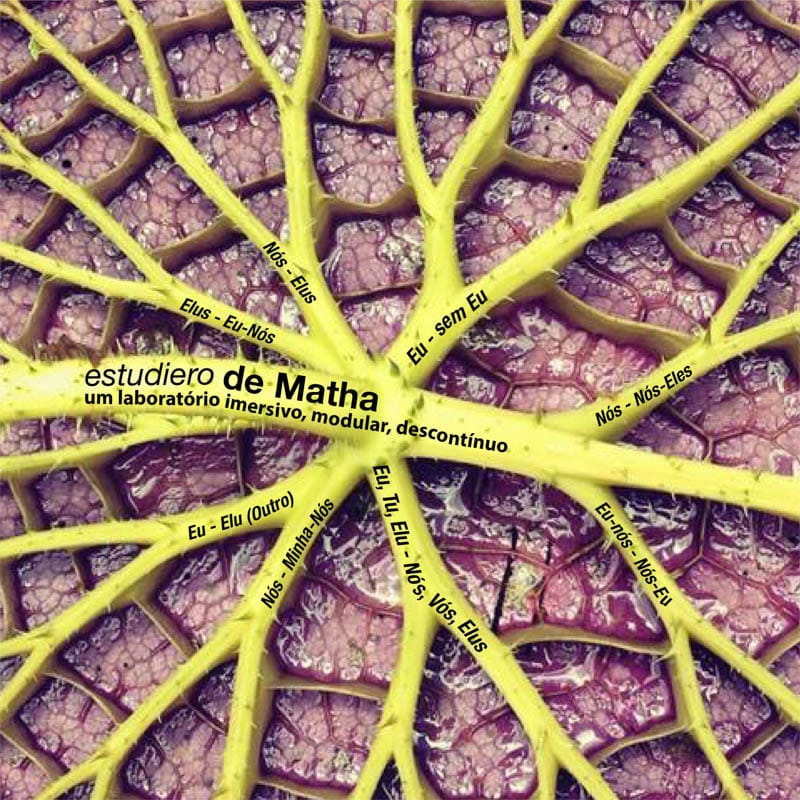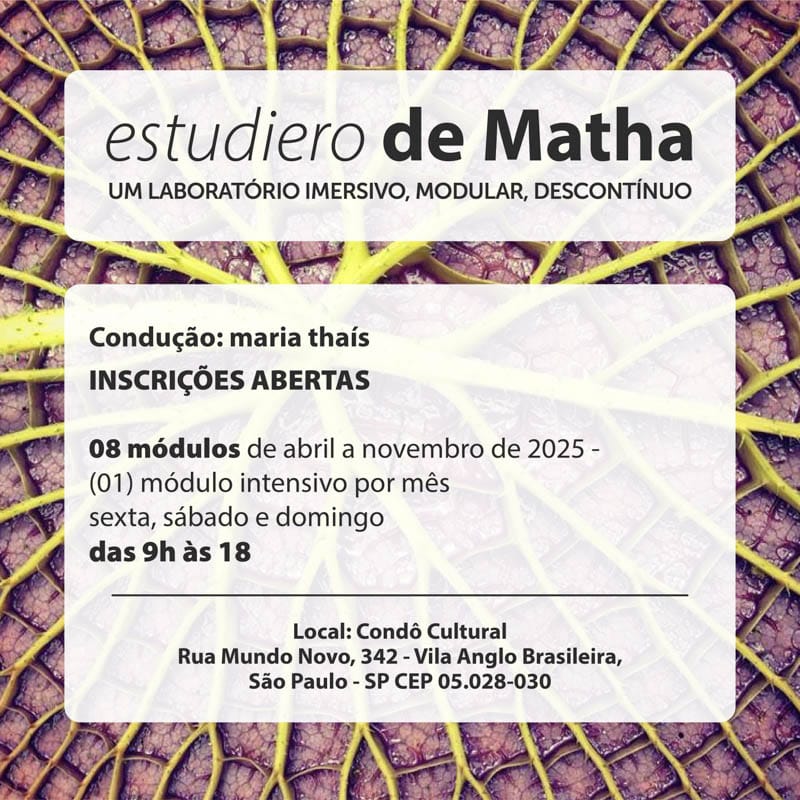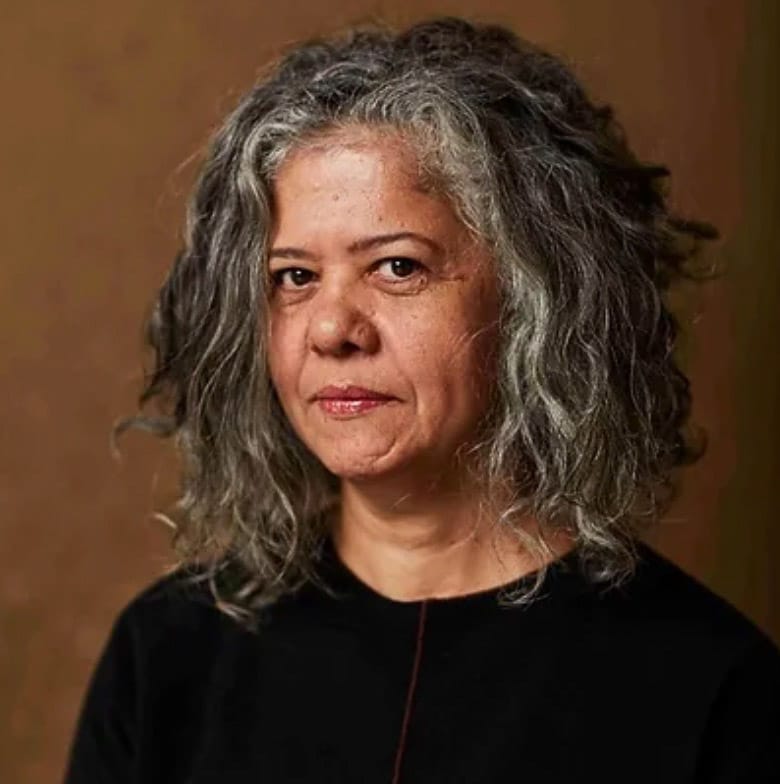
estudiero de Matha: an immersive, modular, discontinuous laboratory
26.09
à 28.09
Format
In person

O student is a closed studio for research and a yard open to transit between worlds. Woven and led by Maria Thaís (or Matha or Tatha), it is a time-place of creation in the Condô Cultural, - a space for artistic practices, conviviality and resistance - to prospect with your feetto confront and differentiate ethical-poetic and pedagogical perspectives for scenic language.

The student is organized in 08 (eight) modules - from April to November 2025 - independent, but intertwined by a perception that takes the art of the actor as the foundation for the creation, analysis and composition of a territory commonwhich is the scene.
The modules take place over one weekend (Friday, Saturday and Sunday) each month, with the main theme being a matter/material - the neutral mask, an oral or literary narrative, a song, poems, dramaturgies, etc. -. The feet go into action to distinguish the ways in which they are expressed in each material, and analyze the proposed relationships - between entities, beings, people, nature, the world, etc. -prospecting the ways of operating, the ethical-poetic principles and the unique technologies that can guide the carving of the scenic language (the cantoria) and intuit its enchanting dimensions (the effect they produce).
___
Who it's for:
Those who are involved in the creation of the scene - in different languages - no matter their function or specialty, and who dedicate themselves to time to the processes.
Important comments:
-
In a laboratory and procedural context everyone acts.
-
There is no observer position
-
Each module requires time preparation, reading - individually and/or collectively -
___
There are 08 modules - 01 intensive module per month
Periodfrom April to November 2025
DaysFriday, Saturday and Sunday
Schedulefrom 9 a.m. to 6 p.m.
Location: Condô Cultural
Rua Mundo Novo, 342
Vila Anglo Brasileira (Perdizes)
São Paulo - SP
05028-030
___
Module Schedule
For each module we propose a pronominal game, taken as a clue relationship systemsThey are different from each other and demand unique expressive possibilities. The route suggests a prospecting path for a scene "that doesn't want to represent".
April 25th, 26th and 27th Module I Me - without Me (Already done)
Material: Neutral mask
The Module investigates the perception of bodies, the means of invulnerability (transmuting itself, taking on the nature of other beings, even of different species, and the various forms of materials), experimenting with the temporal and spatial relations of the Mask, its poetic principles and the expressive dimension of the silence.
May 23rd, 24th and 25th Module II Eu, Tu, Elu - We, You, Elus (Already done)
Material: arrows, songs and narratives of Cabocos, mestres and encantados
Cantos de caboclos, mestres e encantados are a repository of narratives and deeds of beings who live here and in other worlds, with no temporal or spatial boundaries to cross. They will be taken as words-flecks, because they move between the song-word and chant-word and are sustained by the collective body and the transitory condition of their identities.
June 20th, 21st and 22nd Module III Us - Elus (Already done)
Material: literary narrative - Japan
The module looks at literary and narrative material from the Japanese tradition, observing the relationship between the world of the living and the world of the dead. The rich variety of ghosts in Japan's folkloric and religious imagination are part of countless literary narratives and reflect the dimensions of life and social agonies.
1July 8th, 19th and 20th Module IV We - My-We (Canceled)
Material: oral/literary narrative of Amerindian origin - Brazil
The Amerindian tradition suggests relational field among other subjects - animals, trees, social functions, geographical features, celestial bodies, spirits, etc. - who see themselves as people. They are, as the Yanomami call them, "my us", multiplying perspectives of the world and degrees of kinship. We can find them in the various true narratives, from different ethnic groups, that inhabit this territory, but also in literary works, such as Vicente Cecim's (Viagem a Andara) and, contemporarily, in the dramaturgy of Francisco Carlos (Banquete Tupinambá (first play in the Jaquar Cibernético trilogy).
August 22nd, 23rd and 24th Module V I-we - We-me (Already done)
Material: Itans and Afro-diasporic oral narratives
Prospecting oral technologies, their ambiguous sentences, their ideograms, their incomplete structure and images that arrive at a gallop, the parallelisms, meters and rhythms present in the word-poeticsthat erupts like word-actIt is a word that spreads through all layers of the social body, demanding responsibility from those who carry it.
September 26th, 27th and 28th Module VI Us - Us-Them (Canceled)
Material: African literary narrative
Transiting through narratives in which in the cosmic dimension everything is in solidarity and that the unstable balance of human acts requires continuous mediation, to fine-tune everything that is alive, the values that regulate acts and their intangible forces.
October 24th, 25th and 26th Module VII Elus - Me-We (Canceled)
Material: Greek drama
Moving tragedy to its own time, removing it from the universalist and ethnocentric notion, and perhaps stepping onto the stage with its "feet of verse" - rhythms formed by the combination of short and long - its speech acts, its effects and its compositional structure.
November 21st, 22nd and 23rd Module VIII We - My-We (Canceled)
Material: oral/literary narrative of Amerindian origin - Brazil
The Amerindian tradition suggests relational field among other subjects - animals, trees, social functions, geographical features, celestial bodies, spirits, etc. - who see themselves as people. They are, as the Yanomami call them, "my us", multiplying perspectives of the world and degrees of kinship. We can find them in the various true narratives, from different ethnic groups, that inhabit this territory, but also in literary works, such as Vicente Cecim's (Viagem a Andara) and, contemporarily, in the dramaturgy of Francisco Carlos (Banquete Tupinambá (first play in the Jaquar Cibernético trilogy).
Me - Elu (Other) (Canceled)
Material: Russian drama
The rapprochement between I (actor) and Elu - the other (character) is built with the feet, in action, through which the actor "teaches" the character how to act and, at the same time, "learns" from her the circumstances and events of the work. Without overlapping, the monologue is a creative praxis, a transit between two existences.
Once registration has been confirmed, participants will be sent monthly matter/material to be used in the next Module.
___
Sign up here
___
Vacancies and selection:
Filling in the form does not guarantee participation in the student.
Participants registered for all eight modules will take precedence.
The selection process will prioritize the formation of a diverse group - in terms of age, background, experience, ethnicity, gender, race, origin and experience.
When registering, participants will be sent the bibliographical and dramaturgical material to be used in the laboratory.
Affirmative vacancies (Out of stock)
02 full scholarships 100%
02 50% bags
To apply, select the option on the form
-
10 (ten) vacancies, for those taking part in the 08 (eight) Modules;
-
04 (four) vacancies, for those taking part in 04 (four) Modules, sequential or interspersed (depending on the availability of places);
-
04 (four) vacancies, for those taking part in 02 (two) Modules, sequential or interspersed (depending on the availability of places);
-
02 (two) vacancies, for those taking part in 01 (one) Module.
Amounts and payments
Indicate on the form how many and which modules you are applying for.
-
For those taking part in the 08 (eight) Modules - Price: R$ 750.00 per module
-
For those taking part in 04 (four) Modules, sequentially or interspersed (depending on availability of places) - Price: R$ 850.00 per module
-
04 (four) places, for those taking part in 02 (two) Modules, sequentially or interspersed (depending on availability of places) - Price: R$ 950.00 per module
-
02 (two) places, for those taking part in 01 (one) Module - Value: R$ 1,100.00 per module
Payment methods:
Monthly payment by the 10th of each month via pix.
In cash: for those registering for four or eight modules, there will be a discount of 5% if all the modules registered are paid in cash.
Withdrawal policy after payment:
From the first module onwards, 100% of the fee will be refunded with up to 30 days' notice before the start of the module;
Return of 50% of the price with advance notice of up to 15 days before the start of the module;
Return of 30% of the price with advance notice of up to 08 days before the start of the module;
There will be no refund if you withdraw up to 7 days before the start of the module.
___
Contact
___
About maria thaís (matha, tháta, maria and so many other aliases that have christened her over time) is a stage artist and theater pedagogue.
In this trajectory - which in 2025 will be fifty years old - the transmission and artistic processes have always been intertwined, moving from its formation between traditional forms, professional practice and academic research.
team

maria thaís
She works in the field of performing arts, as a theater pedagogue, director and researcher. Senior lecturer at the University of São Paulo - USP.
At the Museu Paulista - USP, she developed the project The Scene as a Chimera from 2020 to 2023. She was a professor in the Department of Performing Arts and a research professor in the Postgraduate Program in Performing Arts at the School of Communication and Arts (ECA/USP) from 2003 to 2019. She also worked from 1993 to 2002 as a professor in the Performing Arts Department at the Arts Institute of the State University of Campinas - Unicamp. She is the author of several articles on theatrical pedagogy and the actor's art, as well as the books: Na Cena do Dr. Dapertutto: Poética e Pedagogia em V.E. Meierhold, Editora Perspectiva, SP, 2010; and, together with Álvaro Machado, she organized the book Balagan - Cia de Teatro (Balagan, 2015).
In May/June 2024, she coordinates the artistic residency as director and theater pedagogue at LeLabo (Lousane - Switzerland) and Centro Amazone (Sicily), with the Aprendere il mondo project, which involves Brazilian, African, Swiss and Sicilian artists. In 2022/23 he directed the show Amazonias - ver a mata que te vê - the result of the artistic-pedagogical project developed at Sesc Pinheiros under his coordination and produced by Sesc SP.
With Yghor Boy, he directed the documentary Territories of Resistance - Narratives in Dispute, Florestanias, Sertanias, Ribeirias and the video-clip Paratodos (2021).
Between September 2020 and May 2021, he coordinated the artistic residency Vagamundos - a scenic laboratory - at CPT - Centro de Pesquisa Teatral - Sesc - São Paulo, with the participation of 48 artists.
She founded Cia Balagan (1999) and directed the following shows: Pentesiléia - treinamento para a batalha final (2017-), Cabras - cabeças que voam, cabeças que rolam (2016-18) Recusa (2012/16), Prometheus - a tragédia do fogo (2011/2015), Západ - A Tragédia do Poder (2006/07), Tauromaquia (2004/06), A Besta na Lua (2003/04), Sacromaquia (2000/01). He has also directed: As Cadelas (1996/97), A Serpente (1995), Os Cegos (1994), among others.
In 2004 he staged Olhos d'Água with Cia. Ismael Ivo (Haus der Kulturen der Welt production) in Berlin/Germany, and Dorotéia - um estudo (2004), by Nelson Rodrigues, at the Intercity São Paulo/2004 Festival in Florence/Italy.
From 1999 to 2006, she worked as a director-pedagogue with the Moscow Theatre - Scholl of Dramatic Art, Moscow/Russia, directed by Anatoli Vassiliev.
Among the numerous artistic-pedagogical activities, the following stand out:
- Pedagogical curator with Adriana Cruz of the Amazon Biennial 2023;
- Professor and supervisor of Itaú Cultural's Management and Cultural Policies Course (2018-2022);
- Research artist at the Amazone Center (Palermo-Italy) in 2019;
Visiting professor at Paris 8-Sorbonne (Paris-France) in 2014 and at ARTA-Association de Recherche des Traditions de l'Acteur (Cartucherie, Paris, France) in 2014 and 2016;
- Coordinator of Sesi's Experimental Theater Center (2010/12);
- Curator of ECUM - International Meeting of Performing Arts and the International Center for Research on Training in the Performing Arts (Russian Pedagogy/2010 program with Workcenter J.Grotowski and Thomas Richards/2011);
- Pedagogical consultant at SP Escola de Teatro (2010);
- Responsible for conceiving, implementing and coordinating the Escola Livre de Teatro project, run by the Culture Department of Santo André City Hall (1990/92).
- He has given workshops and courses in several Brazilian states and in countries such as Italy, Colombia, Russia, France, Switzerland, among others.